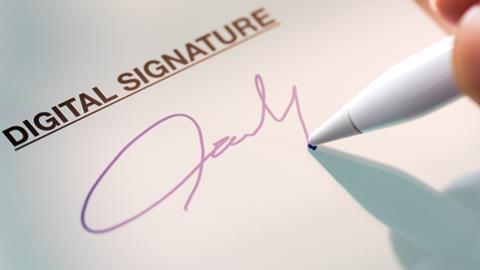Hats off to the Law Commission. Asked to provide what every lawyer hates providing - a short, unequivocal, declaration of how the law of England and Wales stands on a specific issue - the government’s legal brainboxes have come up with an eight-paragraph statement of the law covering documents executed with an electronic signature. (For example a doorstep squiggle on a courier's pad, a name typed into a website or an encrypted code generated by a security dongle.)
The top line is that electronic signatures are valid and admissible in evidence in legal proceedings.
The conciseness and certainty are particularly impressive because the law as it stands emerges from a wide range of authorities, including the common law, statute (the Electronic Communications Act 2000), European (the eIDAS regulation) and case law. While the Law Commission says the government 'may wish to consider codifying the law', to make it more accessible, in general the current portfolio is fit for purpose.
That's certainly the theme of the commission's press release, and one that will be welcomed by governments anxious to keep the UK at the forefront of electronic commerce.
However a closer look at the 124-page report suggests that many loose ends remain. One important point is that the commission's report excludes two significant categories of document, wills and registered dispositions under the Land Registration Act 2002.
Another is the grey area over the witnessing of electronic signatures. In its consultation document, the commission proposed that it should be possible to witness an electronic signature remotely via video link and then to attest the document. It is now taking a more cautious approach, recommending that the requirement for a deed to be signed 'in the presence of a witness' currently requires physical presence. The practical and technical issues of a future remote witnessing process will need to be considered by a proposed industry working group.
More fundamentally, however, the report acknowledges concerns that it may not be possible to witness an electronic signature even when the witness is physically present. One such sceptic is HM Land Registry, which states that it is not possible for an electronic signature to be physically witnessed in the way that a pen and ink signature can. There is no way for a human to be sure that a data string representing a signature is indeed being applied to a data string representing a document. To put it mildly, this is a bit of a bombshell for those trying to digitise the conveyancing process.
Finally, and most welcome, the Law Commission's report fires a shot across the bows of government efforts to set up an online process for applying for lasting powers of attorney. Fears are already mounting over the current system's potential for abuse. Numerous respondents to the Law Commission's consultation said that allowing lasting powers of attorney to be executed with an electronic signature would only increase the risk. The Law Society, for example, said it was strongly opposed to a fully digital process: 'The removal of physical signatures removes an essential safeguard against abuse of a highly vulnerable sector of society'.
The commission agrees. It concludes that the Office of the Public Guardian and MoJ must 'consider what is sufficiently secure and reliable for donors before introducing any system using electronic signatures'.
All this suggests that the wet signature, witnessed and attested in person, will be with us for at least another decade of the digital age.





































No comments yet